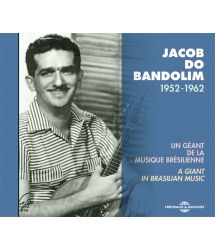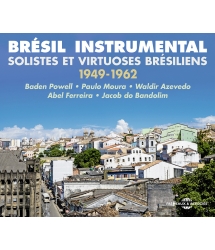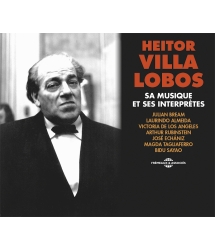- Our Catalog
- Philosophy
- Philosophers of the 20th century and today
- History of Philosophy (PUF)
- Counter-History and Brief Encyclopedia by Michel Onfray
- The philosophical work explained by Luc Ferry
- Ancient thought
- Thinkers of yesterday as seen by the philosophers of today
- Historical philosophical texts interpreted by great actors
- History
- Books (in French)
- Social science
- Historical words
- Audiobooks & Literature
- Our Catalog
- Jazz
- Blues
- Rock - Country - Cajun
- French song
- World music
- Africa
- France
- Québec / Canada
- Hawaï
- West Indies
- Caribbean
- Cuba & Afro-cubain
- Mexico
- South America
- Tango
- Brazil
- Tzigane / Gypsy
- Fado / Portugal
- Flamenco / Spain
- Yiddish / Israel
- China
- Tibet / Nepal
- Asia
- Indian Ocean / Madagascar
- Japan
- Indonesia
- Oceania
- India
- Bangladesh
- USSR / Communist songs
- World music / Miscellaneous
- Classical music
- Composers - Movie Soundtracks
- Sounds of nature
- Our Catalog
- Youth
- Philosophy
- News
- How to order ?
- Receive the catalog
- Manifesto
- Dictionnary











- Our Catalog
- Philosophy
- Philosophers of the 20th century and today
- History of Philosophy (PUF)
- Counter-History and Brief Encyclopedia by Michel Onfray
- The philosophical work explained by Luc Ferry
- Ancient thought
- Thinkers of yesterday as seen by the philosophers of today
- Historical philosophical texts interpreted by great actors
- History
- Books (in French)
- Social science
- Historical words
- Audiobooks & Literature
- Our Catalog
- Jazz
- Blues
- Rock - Country - Cajun
- French song
- World music
- Africa
- France
- Québec / Canada
- Hawaï
- West Indies
- Caribbean
- Cuba & Afro-cubain
- Mexico
- South America
- Tango
- Brazil
- Tzigane / Gypsy
- Fado / Portugal
- Flamenco / Spain
- Yiddish / Israel
- China
- Tibet / Nepal
- Asia
- Indian Ocean / Madagascar
- Japan
- Indonesia
- Oceania
- India
- Bangladesh
- USSR / Communist songs
- World music / Miscellaneous
- Classical music
- Composers - Movie Soundtracks
- Sounds of nature
- Our Catalog
- Youth
- Philosophy
- News
- How to order ?
- Receive the catalog
- Manifesto
- Dictionnary
Noel Rosa - Dorival Caymmi - Vinicius De Moraes
Noel Rosa - Dorival Caymmi - Vinicius De Moraes
Ref.: FA5876
Artistic Direction : TECA CALAZANS ET PHILIPPE LESAGE
Label : FREMEAUX & ASSOCIES
Total duration of the pack : 2 hours 17 minutes
Nbre. CD : 2
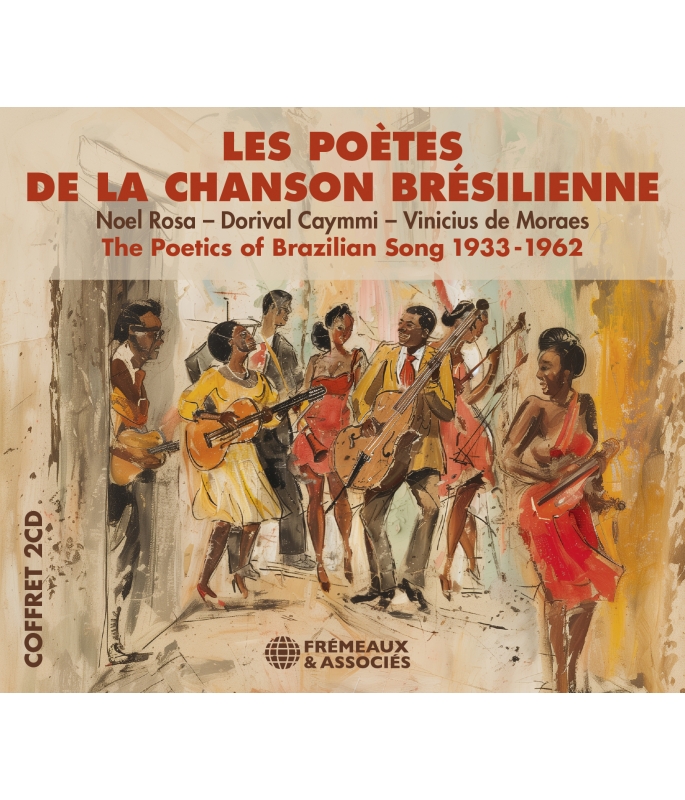
Noel Rosa - Dorival Caymmi - Vinicius De Moraes
Noel Rosa fathered popular urban songs. Dorival Caymmi breathed Afro-Brazilian magic into them, and Vinicius de Moraes was the poet par excellence of bossa nova. This collection also celebrates other in uential artists in Brazil, the likes of Catulo da Paixão Cearense, Cândido das Neves, Orestes Barbosa, Cartola, Ronaldo Bôscoli and Humberto Teixeira. Whether they were black, white or mulatto, from Rio de Janeiro or Nordeste, composer songwriters or lyricists, each of these artists contributed to the stylistic evolution of popular Brazilian songs for half a century. Their literary talents made their verse a thing of extraordinary poetry.
Teca CALAZANS et Philippe LESAGE
CD1 : O VENTO - DORIVAL CAYMMI • SAMBA DA MINHA TERRA - DORIVAL CAYMMI • ACONTECE QUE SOU BAIANO - DORIVAL CAYMMI • SÃO SALVADOR - DORIVAL CAYMMI • SAUDADE DA BAHIA - JOÃO GILBERTO • CORCOVADO - SYLVIA TELLES • AOS PÈS DA CRUZ - JOÃO GILBERTO • COISA MAIS LINDA - JOÃO GILBERTO • O QUE TINHA DE SER - SYLVIA TELLES • BRIGAS, NUNCA MAIS - JOÃO GILBERTO • ESTRADA DO SOL - SYLVIA TELLES • SERENATA DE ADEUS - ELIZETE CARDOSO • OUTRA VEZ - ELIZETE CARDOSO • MEDO DE AMAR - ELIZETE CARDOSO • AS PRAIAS DESERTAS - ELIZETE CARDOSO • ESTRADA BRANCA - ELIZETE CARDOSO • CHEGA DE SAUDADE - JOÃO GILBERTO • MEDITAÇÃO - JOÃO GILBERTO • MANHÁ DE CARNAVAL - JOÃO GILBERTO • VATAPÁ - DORIVAL CAYMMI • O DENGO QUE A NEGA TEM - DORIVAL CAYMMI • DOIS DE FEVEREIRO - DORIVAL CAYMMI • AMARGURA - SYLVIA TELLES • LOBO BOBO - JOÃO GILBERTO • BOLINHA DE PAPEL - JOÃO GILBERTO • SE É TARDE ME PERDOA - SYLVIA TELLES • DINDI - SYLVIA TELLES • COMPROMISSO COM A SAUDADE - SILVIO CALDAS.
CD2 : FOI UMA PEDRA QUE ROLOU - SILVIO CALDAS • FITA AMARELA - SILVIO CALDAS • TRES APITOS - ARACI DE ALMEIDA & RADAMES GNATTALI • PRA QUE MENTIR - ARACI DE ALMEIDA & RADAMES GNATTALI • O X DO PROBLEMA - ARACI DE ALMEIDA & VERO • ULTIMO DESEJO - ARACI DE ALMEIDA & RADAMES GNATTALI • PALPITE INFELIZ - ARACI DE ALMEIDA • FEITIO DE ORAÇÃO - MARILIÁ BATISTA • VOCE VAI SE QUISER - MARILIÁ BATISTA & NOEL ROSA • FEITIÇO DA VILA - ARACI DE ALMEIDA • CONVERSA DE BOTEQUIM - NOEL ROSA • FLAUTA, CAVAQUINHO E VIOLÃO - ARACI DE ALMEIDA • QUEM ME VÊ SORRIR - CARTOLA • CARINHOSO - ORLANDO SILVA • ROSA - ORLANDO SILVA • ULTIMA ESTROFE - SILVIO CALDAS • PAGINA DE DOR - ORLANDO SILVA • SERRA DE BOA ESPERANÇA - FRANCISCO ALVES • ALMA DE TUPI - AUGUSTO CALHEIROS • SERTANEJA - ORLANDO SILVA • GUACYRA - RAUL ROULIEN • VIOLA QUEBRADA - INEZITA BARROSO • LEGUA TIRANA - LUIZ GONZAGA • ASA BRANCA - LUIZ GONZAGA.
DIRECTION ARTISTIQUE : TECA CALAZANS ET PHILIPPE LESAGE
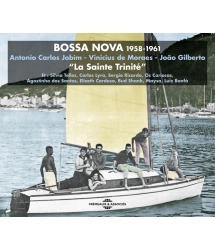
ANTONIO CARLOS JOBIM - VINICIUS DE MORAES - JOÃO...
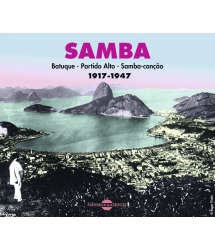
BATUQUE - PARTIDO ALTO - SAMBA CANCAO 1917 - 1947
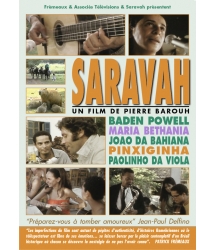
DVD - FILM DE PIERRE BAROUH
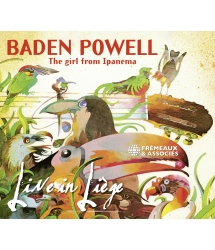
Live in Liège




-
PisteTitleMain artistAutorDurationRegistered in
-
1O VentoDorival CaymmiDorival Caymmi00:03:081959
-
2Samba da Minha TerraDorival CaymmiDorival Caymmi00:01:531957
-
3Acontece Que Sou BaianoDorival CaymmiDorival Caymmi00:02:181960
-
4São SalvadorDorival CaymmiDorival Caymmi00:02:171960
-
5Saudade da BahiaJoão GilbertoDorival Caymmi00:02:151961
-
6CorcovadoSylvia TellesAntonio Carlos Jobim00:02:321960
-
7Aos Pès da CruzJoão GilbertoMarino Pinto00:01:331959
-
8Coisa Mais LindaJoão GilbertoCarlos Lyra00:02:501961
-
9O Que Tinha de SerSylvia TellesAntonio Carlos Jobim00:01:511961
-
10Brigas, Nunca MaisJoão GilbertoAntonio Carlos Jobim00:02:041958
-
11Estrada do SolSylvia TellesAntonio Carlos Jobim00:02:051961
-
12Serenata de AdeusElizete CardosoVinicius de Moraes00:03:081958
-
13Outra VezElizete CardosoAntonio Carlos Jobim00:01:531958
-
14Medo de AmarElizete CardosoVinicius de Moraes00:03:061958
-
15As Praias DesertasElizete CardosoAntonio Carlos Jobim00:02:131958
-
16Estrada BrancaElizete CardosoAntonio Carlos Jobim00:02:271958
-
17Chega de SaudadeJoão GilbertoAntonio Carlos Jobim00:01:591958
-
18MeditaçãoJoão GilbertoAntonio Carlos Jobim00:01:451960
-
19Manhá de CarnavalJoão GilbertoLuiz Bonfa00:02:341959
-
20VatapáDorival CaymmiDorival Caymmi00:02:141957
-
21O Dengo Que A Nega TemDorival CaymmiDorival Caymmi00:02:431960
-
22Dois de FevereiroDorival CaymmiDorival Caymmi00:02:351959
-
23AmarguraSylvia TellesRadames Gnattali00:02:451958
-
24Lobo BoboJoão GilbertoCarlos Lyra00:01:191959
-
25Bolinha de PapelJoão GilbertoGeraldo Pereira00:01:181961
-
26Se é tarde me perdoaSylvia TellesCarlos Lyra00:01:431960
-
27DindiSylvia TellesAntonio Carlos Jobim00:02:351959
-
28Compromisso Com A SaudadeSilvio CaldasBilly Branco00:02:031958
-
PisteTitleMain artistAutorDurationRegistered in
-
1Foi Uma Pedra Que RolouSilvio CaldasPedro Caetano00:02:481958
-
2Fita AmarelaSilvio CaldasNoel Rosa00:02:361957
-
3Tres ApitosAraci de Almeida, Radames GnattaliNoel Rosa00:03:141951
-
4Pra Que MentirAraci de AlmeidaNoel Rosa00:03:061951
-
5O X do ProblemaAraci de Almeida, VeroNoel Rosa00:02:521950
-
6Ultimo DesejoAraci de Almeida, Radames GnattaliNoel Rosa00:03:171950
-
7Palpite InfelizAraci de AlmeidaNoel Rosa00:03:041935
-
8Feitio de OraçãoMariliá BatistaNoel Rosa00:03:101953
-
9Voce Vai Se QuiserMariliá Batista, Noel RosaNoel Rosa00:02:341937
-
10Feitiço da VilaAraci de AlmeidaNoel Rosa00:03:081950
-
11Conversa de BotequimNoel RosaNoel Rosa00:02:471935
-
12Flauta, Cavaquinho e ViolãoAraci de AlmeidaCustodio Mesquita00:02:571945
-
13Quem Me Vê SorrirCartolaCartola00:02:211940
-
14CarinhosoOrlando SilvaPixinguinha00:02:471937
-
15RosaOrlando SilvaPixinguinha00:03:161937
-
16Ultima EstrofeSilvio CaldasCandido das Neves00:04:391960
-
17Pagina de DorOrlando SilvaCandido das Neves00:03:431938
-
18Serra de Boa EsperançaFrancisco AlvesLamartine Babo00:03:271937
-
19Alma de TupiAugusto CalheirosJose Luiz Calazans00:03:231933
-
20SertanejaOrlando SilvaRené Bittencourt00:03:091939
-
21GuacyraRaul RoulienHeckel Tavares00:02:291937
-
22Viola QuebradaInezita BarrosoMario de Andrade00:03:471955
-
23Legua TiranaLuiz GonzagaLuis Gonzaga00:02:471947
-
24Asa BrancaLuiz GonzagaLuis Gonzaga00:02:531947
The Poetics of Brazilian Song 1933-1962
Noel Rosa – Dorival Caymmi – Vinicius de Moraes
The poetics of Brazilian Song
For those who don’t speak Portuguese, the poetic feeling of a Brazilian song relies on the musicality of the lyrics, which is fine as far as it goes, but the sensibilities that reign over the country’s soul are left in shadow. For a better grasp of the quality that lies in the content and in the writing that make up the repertoire of Brazil’s popular music, this anthology concentrates on the work of three immense figures in Brazilian song (Noel Rosa, Dorival Caymmi and Vinicius de Moraes), and of other artists – Geraldo Pereira, Lamartine Babo, Orestes Barbosa, Ronaldo Bôscoli, Billy Blanco, Antônio Maria, Humberto Teixieira, Catulo da Paixão Cearense and Cândido das Neves – who all embraced the stylistic evolutions of popular Brazilian songs in the first half of the 20th century. Some, like Noel Rosa and Dorival Caymmi, sang their own words and music – they were singer-composer-songwriters – whereas others were principally lyricists; all of them, however, had literary talents that lent their words and versification a halo that is highly poetic.
Any interest in songs immediately entails an observation: words and music are two registers of feeling that reinforce each other. And the major characteristic of Brazilian popular song is that the words of the most meaningful works have a poetic tempo that doesn’t allow them to stray from the music. In Brazil, a “letrista” (lyricist) is quickly classified as a “poet” because of a simple truth: there are lyricists whose talents perfectly justify the use of that word. Writers like Orestes Barbosa and Vinicius de Moraes had already acquired fame as poets thanks to their published work, even before they started writing song lyrics. It could also happen that a recognised lyricist would become a composer: Vinicius de Moraes himself wrote both the words and the melodies of several songs, including the masterly Serenata de Adeus. And the reverse is also true: there were composers known for their music who showed a talent for writing lyrics also. The perfect example of that is Antonio Carlos Jobim, who wrote Corcovado and Aguas de Março: using short words that sound like as many notes of a song, he achieved a reputation that certainly allowed him a claim to fame as a poet.
Here we aim to deal with a period in history (1900–1962) that covers the following: romantic songs with Parnassian connotations (works by Catulo da Paixão Cearense and Cândido das Neves); the poetry of Vinicius de Moraes, which has the freshness of a dewdrop; the creativity of the urban popular songs we owe to Noel Rosa; and also the Afro-Brazilian atmosphere one finds in the work of Dorival Caymmi, who was from Bahia. So Brazil is represented in all its diversity, because Geraldo Pereira, Cartola and Cândido das Neves are black artists, and Dorival Caymmi a mulatto; Humberto Teixeira (one of Luiz Gonzaga’s three regular lyricists), Catulo, Dorival Caymmi and Antonio Maria all represent the Nordeste region, whereas white artists like Noel Rosa, Vinicius de Moraes and Ronaldo Bôscoli were more representative of Rio de Janeiro, and also of a certain bourgeoisie. This demonstrates that songs are not detached from the time and society in which they are born. That is a fact that obliges us to deploy a historical and biographical approach, and from a sociological and musicological perspective, in presenting the following portraits of the artists concerned.
Noel Rosa
Born on 10 December 1910 in the Vila Isabel quarter of Rio de Janeiro, Noel de Medeiros Rosa passed away on 4 May 1937 in that same district whose space for resistance he loved so much. He traversed the skies of Brazilian song like a meteor, and died at a fateful age (27, like some of our contemporary rock stars), burnt by a dissolute existence. Yet he left such an indelible trace that his fame was even amplified at the end of the forties after the rediscovery of his most intimate songs, whose poetry burned with passion and pessimism. With Rosa, modern urban song came to full bloom, because he inaugurated a new era: his language was close to everyday speech, and his sambas were genuine chronicles far from the exaggerations of romanticism. Rosa was also one of the first white sambistas who could identify with those of Morro de Mangueira and the Estacio quarter, and he made the transition between the black ethos and the middle classes without in any way toning down the native beauties of the samba.
In those years that they called the Epoca de ouro, his talent and sense of improvisation subjugated his audiences, whether in a studio, on radio or onstage. Yet Noel Rosa had to overcome much reticence in acquiring a following: the public was embarrassed by his looks, by his small stature and by how thin he was. He took no care of his health, ate and slept little, drank a great deal, and dressed poorly, always wearing dirty shoes. And he only left the botequims in the small hours of the morning. He had his share of anxiety, nervousness and timidity, but he was extremely quick-witted, impertinent, and he never ceased composing. He felt at home with sambistas of the Morro de Mangueira like Cartola or those in Estacio, (twelve sambas with Ismael Silva were published), which shows how ridiculous it is to summarise the samba as “negritude,” and just as inept to regard the samba as music fit only for the “Carnaval”.
So Noel Rosa set fire to his life, no doubt gnawed away by the suicides of his father and grandfather, and by his own degraded image (his birth was a forceps delivery, and it disfigured his jaw). He lived in Vila Isabel, a middle-bourgeois quarter where his father was a doctor; Noel Rosa also studied medicine, but quickly abandoned it in favour of a bohemian life and music; his younger brother would become the second doctor in the family. When his teens were behind him, he joined A Banda dos Tangaras (with João de Barro, and Almirante who would later enjoy a fine career), a group of young white artists influenced by the Grupo de Caxànga of Joao Pernambuco (its musical colouring was that of the Nordeste), but the samba won him over and he quickly struck up a close personal and professional relationship with the black sambistas. His first hit was a samba suggestive of a carnival, Com Que Roupa? And his sambas, which were genuine, caustic chronicles of the life of the Cariocas, had a success that never waned, giving Rosa a visibility that led to a bohemian existence which ended only when he died of tuberculosis (his final composition was Eu Sei Sofrer).
Com Que Roupa? was recorded on 30 September 1930 and the song was a huge success at the 1931 carnival; it introduced the style of Noel Rosa to Brazil. From now on his texts would overflow with rich rhymes, break with the conventions of poetry, and reject romanticism’s exaggerations. In his records you can hear freedom in the tone and modern scansion; it matched the samba’s inner needs. The piece can be divided into two veins: the first conveys bitterness, pessimism tied to passion, jealousy, and betrayal of an autobiographical or passionate order; the second concentrates on elation, optimism, daily chronicles and picturesque events, at the same time as it carries the intense excitement of Vila Isabel and the samba, always seen with satire and irony. He reflected the nationalist populism of his times, that of the first Republic; however, he did so without any direct reference to the political order, and still maintained a critical eye. The samba was a mode of deciphering existence.
One is right to insist on the depth and quality of the writing in the texts, but that shouldn’t make us forget that Rosa was a melodist too often held in low esteem. After 1933, his songs were abundant and fertile but never fell into the trap of facility; and besides, the words and the music would fit together marvellously and create a perfect harmony of climates, themes and structures. Alone, he composed 108 of the 259 compositions in his repertoire. Those include the sensational Com Que Roupa?, Fita Amarela, Vôce Vai Se Quiser, Tres Apitos and Ultimo Desejo. We can underline the fact that Tres Apitos was not recorded until 1951 by Araci de Almeida, and that the ultimate session of November 1937 recorded Provei, Voce Vai Se Quiser, Quem Ri Melhor, and Quantos Beijos in duet with Marìlia Batista, his favourite partner. We must confess that the modernity of Conversa de Botequim always leaves us breathless with admiration.
It is worth mentioning other sambistas after the above summary of Noel Rosa’s work. Cartola (Angenor de Oliveira, 1908–1980), together with Carlos Cachaça (Carlos Moreira de Castro, 1902–1999), was Rosa’s most regular partner, one of the founders of the GRES Estação Primeira de Mangueira, the famous samba school at the origin of the modern carnival. Together they composed Nao Quero Mais Amar A Ninguen. With Rosa, Cartola also composed Não Faz Amor. After he vanished from the world of music in 1941, he was rediscovered when the journalist Sergio Porto recognised him by chance in the street, where Cartola was washing cars. He recorded his first LP in 1966.
Lamartine Babo (1904–1963) was a radio man who wrote numerous successful carnival marchinhas; he was close to Rosa, composing sambas with him that include AEIOU. Orestes Barbosa (1893–1966) was of the same generation, another friend of Noel Rosa with whom he composed the sambas Positivismo and O Samba Não Tem Tradução. He published several books of poems and was also a journalist: he had a scathing pen that earned him a few brief stays in prison in the twenties... Artistically he was very closely associated with Silvio Caldas, his most regular confederate when writing songs in the romantic tradition of the modinhas and those would always remain part of the national heritage.
Pedro Caetano (1911–1992) could be classified as a romantic sambista. We owe him Foi Uma Pedra Que Rolou, which was written in 1922 and sung by Silvio Caldas in 1934; the version included in this anthology is a much later one. Together with Claudionor Cruz, Caetano composed two little gems: Caprichos do Destino and Onde Estão Os Tamborims, a samba performed by the group Quatro Ases e Um Coringa (included in our samba anthology).
Geraldo Pereira (1918–1955), who died after a brawl with the drag performer known as Madame Satã, was the writer of rather innovative sambas that his friend Joao Gilberto would record with success (Falsa Baiana and Bolinha de Papel).
Dorival Caymmi
You can take our word for this: Dorival Caymmi was a delicious man filled with mischief. His singular portrait can be drawn in several dimensions. The first would be the fact that, over the airwaves of national radio at the close of the thirties, he introduced Brazil to the magic of Bahia and Afro-Brazilian culture. But more than that, he had a very strong presence as an artist; in an outwardly simple fashion, he knitted a perfect plasticity between words and music. His art also anticipated the arrival of bossa nova (Caymmi would always make altered chords richer). He was also generally thought to be lazy, but in reality he was a true artisan and a perfectionist: after a career that lasted seventy years his legacy was one hundred songs.
A synthesis of his work covers these four aspects: his cançoes praieras are sublime songs whose themes are the sea and the lives of ordinary fishermen; there are songs based on traditional motifs, with syllables and notes that come in combinations; then you have his sambas inspired by the Cariocas of Rio, although not in the Morro style; and finally there are his songs that announced the coming Bossa Nova movement. When he was first heard on Brazilian radio, his harmonic vocabulary was brand-new, as was his singing and the way he accompanied himself on the guitar. He was a self-taught composer with a great gift: he wrote songs that sounded natural to the ear, yet his poetry translated the inexplicable forces of Nature while forming a chronicle of his times. He was like a good writer of novellas, in that he introduced into his songs a storybook conduct that married his words to a picturesque, descriptive aspect.
Dorival Caymmi almost covered the previous century: he was born on 30 April 1914 and passed away on 16 August 2008, at the ripe old age of 94. His maternal grandparents were black, and his father Enrico Caimi (the spelling Caymmi would appear later for reasons unknown) was an Italian immigrant who came to work on the iconic Lacerda elevador in Salvador. He came down to Rio from the north in 1938, and purely by chance he made an appearance in the film “Banana da Terra” singing a duet with Carmen Miranda. It launched his career. The most fertile period covered the years 1942–1957, with landmark titles such as Vatapa, Acontece que Sou Baian and Saudade de Bahia…. We should let Chico Buarque have the last word: “contra fel, moléstia, crime, use Dorival Caymmi” (“against bitterness, abuse and crime, call Dorival Caymmi.”)
Vinicius de Moraes
Does anyone still need an introduction to Vinicius de Moraes? This is the writer who delivered the movement called Bossa Nova, and his aura in France (and elsewhere) is so flamboyant that it became a stylised image for a Brazil that always wore a smile. And it’s true that bossa nova would never have seen the light – although there was already something in the air that was impatient to come to bloom – without the joined talents of João Gilberto, Antonio Carlos Jobim and Vinicius. Bossa Nova was above all a way of playing, singing and harmonising with basic ingredients: modern melody, altered chords, a song without vibrato that focused on a private world of feelings... while voice, guitar and drums played with patterned rhythms. You can identify the imprint of Vinicius in any context, no matter which composer he was working with, from Tom Jobim to Carlos Lira and Baden Powell. A summary of his artistry would say at least two things: he rejected solemn versification (although he had earlier written the marvellous sonetos that established his fame as a poet), and that he relied on a love-lexicon that defended a chaste immodesty. In short, his versification was an art that could only blossom with music.
Marcus Vinicius da Cruz de Mello Moraes – his father was fond of Latin and named him Marcus Vinicius – was born on 19 October 1913 into a middle-class, high-flying intellectual milieu (he would die on 9 July 1980). Before throwing himself into writing lyrics for songs, between 1931 and 1946 he published several monographs of poetry including Poemas, Sonetos e Baladas that were praised by Manuel Bandeira and Mario de Andrade. Vinicius had also decided on a diplomatic career; the military would put an end to that in 1969, after postings that included an appointment as consul in Los Angeles and then as embassy secretary in Paris. It was in the French capital that he made the acquaintance of the producer Sacha Gordine, who advised him to look for a composer to set to music his stage play Orfeu da Conceição. And then one day, at the restaurant Casa Villarino, he met Antonio Carlos Jobim. Their “musical” was an international hit at the 1959 Cannes Film Festival: in Orfeu Negro, audiences discovered the songs A Felicidade and Se todos Fossem Iguais a Voce (and Manhà de Carnaval, the latter a composition by Luiz Bonfa and Antônio Maria.) In seven years, “Tom” Jobim and Vinicius would write 46 gems that modernised Brazilian song: they featured light themes that created a bond between the sea, the sands, a life of love, and the garota of Ipanema.
Here we have included five songs performed by Elizete Cardoso, two of them written by Vinicius alone (Serenata de Adeus and Medo de Amar) in addition to Outra Vez and As Praias Desertas written by Jobim alone. Those titles are taken from the album Canção do Amor Demais... A landmark recording because it marks a date, it has a story, and it dissatisfied all those who were involved: it is an unbalanced object that unconsciously offers a transition between tradition and modernity. Jobim and Vinicius wanted Dolores Duran to take part, but had to yield to the producer’s desire for the participation of Elizete Cardoso, known as “A Divina,” and whose standing was already well-established in the song-world of the era. Elizete Cardoso was not only uncomfortable with the rhythmically modern versification, but also unhappy with the revolutionary guitar of João Gilberto – so much so, in fact, that Gilberto walked out of the room. This was the record where Chega de Saudade first appeared, but it is the version recorded a few months later by Joao Gilberto that we have here, a flashing hit that signed the birth-certificate of the Bossa Nova movement.
A few words can be added here concerning Ronaldo Bôscoli (1928–1994). People found him disagreeable and manipulative, and he was married for a time to Elis Regina, but his best texts were written for compositions by two partners, Roberto Menescal and Carlos Lira. The humour in Lobo Bobo is particularly well-served by Gilberto’s performance. In passing, a mention for Antônio Maria from Pernambuco (1921–1964) who quickly became a feature of the bohemian life enjoyed by Rio’s Cariocas. Antônio Maria was a sports commentator and journalist who wrote the samba-cançao entitled Ninguem Me Ama and the unavoidable Manhà de Carnaval. Also of note was Billy Blanco (1924-2011) who was born in Belem but trained as an architect in São Paulo. Blanco co-wrote Tereza da Praia and Sinfonia do Rio de Janeiro with Tom Jobim, and Samba Triste with Baden Powell. His songs have been performed by every great voice of the period, including Dick Farney, Lucio Alves and Silvio Caldas.
Catulo da Paixão Cearense, Cândido das Neves
We turn our gaze to the beginning of the 20th century with Catulo da Paixão Cearense and Cândido das Neves. Both pioneered the urban songs of Brazil in taking some of the first steps in Brazil’s phonographic industry. However, they remained very influenced by the romantic poets of the 19th century who established an idealised vision of the female, thereby extending in a way the imperial modinha. Both rose to fame, and some of their songs occupy a major place in Brazil’s national heritage.
“Cearense” means “from Ceará,” but Ceará was where Catulo’s father was born. Catulo Cearense was born in São Luis do Maranhão on 8 October 1863 or on 31 January 1866 but his surname, a difficult one to have, is indeed Paixão (passion). He would remain poor all of his life despite great celebrity as a writer and performer. He was also a show-off and a megalomaniac, and sang while accompanying himself on the guitar, seducing a number of female admirers in the upper echelons of society... although he always preferred to live with mulatto women of the people. According to Villa Lobos, who was one of his close circle, Catulo had no gifts as a composer, but Mario de Andrade described him as “the greatest creator of images in Brazilian poetry.” Catulo set his verse to melodies composed by others, but also kept quiet about their names: for example, he gave the title Rasga o Coração to Joaquim Callado’s composition Iara. His works can be divided into approximately two periods, the first in the modinha tradition, while the second turns to themes from the Nordeste where the poems sing of the Sertão (Caboca de Caxànga with a melody written by João Pernambuco, or Luar do Sertão).
Cândido das Neves was the son of Eduardo das Neves (1871–1919), the first black artist to become famous as a clown, and he was a singer who appeared onstage wearing a blue tuxedo, a silk hat and a monocle... Cândido (24 July 1899-4 November 1934) was faithful to a popular modinha that sang of Nature with a pompous romanticism, and some of his songs, like A Ultima Estrofe, would be recorded after he died (suddenly) of tuberculosis. He was the author of Pagina de Dor (with music composed by Pixinguinha), Noite Cheia de Estrellas, Lagrimas and Apoteose do Amor, all of them major songs in Brazil’s heritage.
Humberto Teixeira (1916–1979) was also from the Nordeste, and one of three regular lyricists who worked with Luiz Gonzaga (with whom he wrote, among other successful songs, Baião, Assum Preto, Qui Nem Jilo and Asa Branca, which relate the joys and misfortunes of the poor people of Sertão. Humberto Teixeira trained as a lawyer and it was his profession; he was also a member of the federal government and a great defender of authors’ rights.
Adapted by Martin Davies from the French text
of Philippe Lesage and Teca Calazans
© 2024 FRÉMEAUX & ASSOCIÉS
Portuguese bibliography
João Maximo & Carlos Didier : Noel Rosa uma biografia
Jairo Severiano & Zuza Homen de Mello : A Canção No Tempo
Jairo Severiano : Uma Historia da Musica Popular Brasileira
This anthology is dedicated to Jairo Severiano, who passed away in August 2022 at the age of 95.
With thanks to Mauricio Carrilho and Pedro Aragão.
Discographie CD1
1 – O Vento (Dorival Caymmi) 3:08
Dorival Caymmi (chant, guitare)
LP Caymmi e suas canções praieras
Odeon MOFB 3099 / 1959
2 – Samba da Minha Terra (Dorival Caymmi) 1:53
Dorival Caymmi (chant, guitare)
LP Eu Vou Pra Marancagalha
Odeon 1957
3 – Acontece Que Eu Sou Baiano (Dorival Caymmi) 2:18
Dorival Caymmi (voc), orquestraçoes Maestro Gaya
LP Eu Não Tenho Onde Morar
Odeon MOFB 3150 / 1960
4 – São Salvador (Dorival Caymmi) 2:17
Dorival Caymmi (voc), orquestraçoes Maestro Gaya
LP Eu Não Tenho Onde Morar
Odeon MOFB 3150 / 1960
5 – Saudade da Bahia (Dorival Caymmi) 2:15
João Gilberto (vocal, guitare), direction musicale : Jobim
LP João Gilberto
Odeon 3202 / 1961
6 – Corcovado (Antonio Carlos Jobim) 2:32
Sylvia Telles (voc) com orquestra
LP Amor Em HIFI
Philips 6485 – 110 / 1960
7- Aos Pès Da Cruz (Marino Pinto – Zé da Zilda) 1:33
João Gilberto (voc, g) ; direction musicale : Jobim
LP Chega de Saudade / 1959
8 – Coisa Mais Linda (Carlos Lyra – Vinicius de Moraes) 2:50
João Gilberto (voc, guitare) - direction musicale : Jobim
LP Joao Gilberto
Odeon MOFB 3202 / 1961
9 – O Que Tinha de Ser (Aantonio Carlos Jobim) 1:51
Sylvia Telles (chant); C/ Orquestra
LP Amor de Gente Moça
Odeon / 1961
10 – Brigas, Nunca Mais (Antonio Carlos Jobim –
Vinicius de Moraes) 2:04
João Gilberto (voc, guitare) + direction musicale : Jobim
LP Chega de Saudade
Odéon / 1958
11 – Estrada do Sol (Antonio Carlos Jobim – Dolores Duran) 2:05
Sylvia Telles (vo), direction musicale de Bill Hitchcock ; Barney Kessel (guitare)
LP USA
Fontana 6485- 102 / 1961
12 – Serenata de Adeus (Vinicius de Moraaes) 3:08
Elizete Cardoso (vocal), arranjos, rêgencia e piano :
AC Jobim (Irany Pinto : vln; Copinha : fl; Gaucho et Maciel : Tb ; Herbert : trompa; Vidal : bass; Juquinha : batterie
+ 7 violons, 2 altos et 2 violoncelles)
LP Cançoes Do Amor Demais
Festa LAV 6002 / 1958
13 – Outra vez (Antonio Carlos Jobim) 1:53
Same as 12 mais en plus João Gilberto ; guitare
14 – Medo De Amar (Vinicius de Moraes) 3:06
Same as 12
15 – As Praias Desertas (Antonio Carlos Jobim) 2:13
Same as 12
16 – Estrada Branca (Antonio Carlos Jobim –
Vinicius de Moraes) 2:27
Same as 12
17 – Chega de Saudade – (Antonio Carlos Jobim –
V de Moraes) 1:59
João Gilberto (voc, g) ; direction musicale : A.C. Jobim
Odeon 14.360 / juillet 1958
18 – Meditação (Antonio Carlos Jobim – Newton
Mendoça) 1:45
João Gilberto (voc, g); direction musicale : Jobim
LP João Gilberto : O Amor, O Sorriso e A Flor
EMI – Odeon SMOFB 3151 / 1960
19 – Manha de Carnaval (Luiz Bonfá – Antônio Maria) 2:34
João Gilberto, direction musicale : A. C. Jobim
Odeon MS OQ-5327 / 1959
20 – Vatapá (Dorival Caymmi) 2:14
Dorival Caymmi (voc), Leo Perrachi e sua orquestra
LP Eu Vou Pra Maracangalha
Odeon/ 1957
21 – O Dengo Que A Nega Tem (Dorival Caymmi) 2:43
Dorival Caymmi (voc), orqestração Maestro Gaya
LP Eu Não Tenho Onde Morar
Odeon MOFB 3150/ 1960
22 – Dois de Fevereiro (Dorival Caymmi) 2:35
Dorival Caymmi (voc, g)
LP Caymmi e Seu Violão
Odeon MOFB 3099 / 1959
23 – Amargura (Radames Gnattali – Alberto Ribeiro) 2:45
Sylvia Telles (voc), direction musicale ; AC Jobim ;
Odeon MOFB3093 / 1958
24 – Lobo Bobo (Carlos Lyra – Ronaldo Bôscoli) 1:19
João Gilberto (voc – g), direction musicale
de Antonio Carlos Jobim
Odeon MOFB 7073 / 1959
25 – Bolinha de Papel (Geraldo Pereira) 1:18
João Gilberto (voc, g) ; com Walter Wanderley e seu conjunto
Odeon MOFB 3202 / 1961
26 – Se E Tarde Me Perdoa (Carlos Lyra – Ronaldo
Bôscoli) 1:43
Sylvia Telles (voc) C/ orquestra
LP Amor Em HiFI
Philips 6485 – 110 / 1960
27 – Dindi (Antonio Carlos Jobim – Aloysio de Oliveira) 2:35
Sylvia Telles (voc), arranjos Mestro Gaya; rêgencia :
Oswaldo Borba
LP Amor de Gente Boa
Odeon MOFB 3084/ 1959
28 – Compromisso Com A Saudade (Billy Blanco) 2:03
Silvio Caldas (voc) com Boêmios da Cidade (Canhoto – cavaquinho -, Dino et Meira – guitares, Carlos Poyares :
fl ; Orlando Silveira : acc)
LP Cabelos Brancos / 1958
Discographie CD2
1 – Foi Uma Pedra Que Rolou (Pedro Caetano) 2:48
Silvio Caldas (voc) e Boêmios da Cidade (Canhoto – cavaquinho; Dino et Meira : guitares ; Carlos Poyares -fl)
LP Cabelos Brancos / 1958
2 – Fita Amarela (Noel Rosa) 2:36
SIlvio Caldas (voc), c/ orq de Renato de Oliveirra
LP Serenata / 1957
3 – Tres Apitos (Noel Rosa) 3:14
(Les trois sirènes de l’usine)
Araci de Almeida (voc) C/Radames e sua orquestra de cordas (guitare soliste : Garoto)
Continental 16892 – B / Mars 1951
4 – Pra Que Mentir (Noel Rosa – Osvaldo Gogliano “Vadico”) 3:06
Araci de Almeida (voc) C/ Radames e sua orquestra de cordas
Continental 16.391 – A. / Mars 1951
5 – O X do Problema (Noel Rosa) 2:52
(le nœud du problème)
Araci de Almeida C/ Vero e sua orquestra
Continental 16.915- B / Septembre 1950
6 – Ulltimo Desejo (Noel Rosa) 3:17
(dernier désir)
Araci de Almeida (voc) C / Francisco Sergi e sua orquestra
Continental 16318 – B / Septembre 1950
7 – Palpite Infeliz (Noel Rosa) 3:04
Araci de Almeida e Regional (non identifé)
Vocalion 34007- A / décembre 1935
8 – Feitio de Oração (Noel Rosa – Osvaldo Gogliano “Vadico”) 3:10
(prière du cœur)
Marilia Batista c/ Aldo Taranto
Disco Radio OOO1 / 1953
9 – Vôce Vai Si Quiser (Noel Rosa) 2:34
Marilia Batista et Noel Rosa (chant) C/ regional
de Benedito Lacerda
Odeon 11421 / Janvier 1937
10 – Feitiço da Vila (Noel Rosa – Osvaldo Gogliano “Vadico”) 3:08
(magie du quartier Vila)
Araci de Almeida c/ Francisco Sergi e sua orquestra
Continental 16 318- A / Septembre 1950
11 – Conserva de Botequim (Noel Rosa – Osvaldo Gogliano “Vadico”) 2:47
(conversation de bar)
Noel Rosa (vocal), C/ Regional Odeon
Odeon 11257 – B / Juillet 1935
12 – Flauta, Cavaquinho e Violão (Custodio Mesquita – Orestes Barbosa) 2:57
Araci de Almeida (voc) C/ Rogerio Guimaraes e seu regional
Odeon 12.622 – B / Juillet 1945
13 – Quem Me Vê Sorrir (Cartola – Moreira de Castro
aka Carlos Cachaça) 2:21
Angenor de Oliveira aka Cartola (voc) C/ Coro da Mangueira (as pastoras Neuma, Ceceia, Nadir, Ornelia, Guiomar,Nesilia, Naguinha), Aloisiio Dias: guitare et plusieurs percussionnistes
Columbia 36509 / 1940
14 – Carinhoso (Pixinguinha – João de Barro) 2:47
Orlando Silva C/ Conjunto Regional RCA Victor
RCA Victor / 1937
15 – Rosa (Pixinguinha – Otavio de Sousa) 3:16
Orlando Silva C/ Conjunto Regional RCA Victor
RCA Victor 34 181 / 1937
16 – Ultima Estrofe (Cândido das Neves “Indio”) 4:39
Silvio Caldas C/Regional de Canhoto
LP Eternamente / 1960
17 – Pagina de Dor (Cândido das Neves “Indío”) 3:43
Orlando Silva C/ Pixinguinha (flûte) e orquestra Victor Brasileira, dir : Radames Gnattali
RCA Victor 34; 354 / 1938
18 – Serra de Boa Esperança (Lamartine Babo) 3:27
Francisco Alves C/ orq Victor Brasileira
Victor 34174- A / 1937
19 – Alma de Tupi (José Luiz Calazans “Jararaca”) 3:23
Augusto Calheiros C/ Orq Victor Brasileira
Victor 33 – 697 – A / Sept 1933
20 – Sertaneja (René Bittencourt) 3:09
Orlando Silva C/ orq
Victor 34 455 / 1939
21 – Guacyra (Heckel Tavares – Joracy Camargo) 2:29
Raul Roulien :voc, H. Tavares : piano ; Guilherme Pereira : piston
Victor 33 631 – B/ Février 1937
22 – Viola Quebrada (Mario de Andrade) 3:47
Inezita Barroso (voc) C/ orq de Hervé Cordovil
Barclay 86.016, Ca 1955
23 – Legua Tirana (Luiz Gonzaga – Humberto Teixieira) 2:47
Luiz Gonzaga (voz e sanfona) et son ensemble
RCA Victor 80. 0606 -B / Juillet 1947
24 – Asa Branca (Luiz Gonzaga – Humberto teixieira) 2:53
Luiz Gonzaga (voz e sanfona) et son ensemble
RCA Victor 78 Rpm 80.0510 – B / Mars 1947

